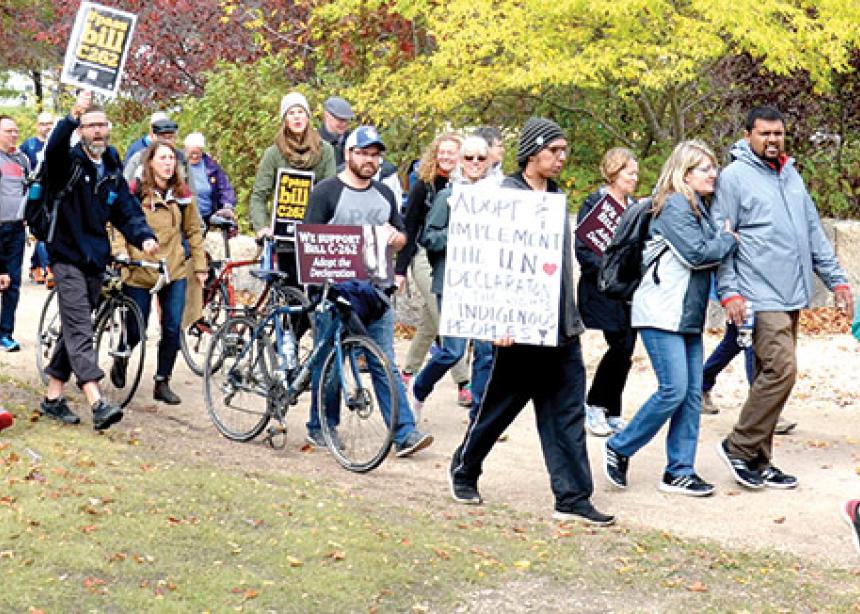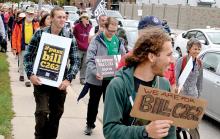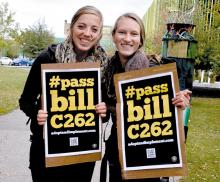“Walk the talk of nation to nation. Implement the declaration!”
More than a hundred people chanted these words as they walked for Indigenous rights in Winnipeg, situated on Treaty 1 land, on Sept. 23, 2017.
The group met at Stephen Juba Park and walked 12 kilometres to the National Centre for Truth and Reconciliation in support of Bill C-262, a private member’s bill that, if passed, would begin the process of harmonizing Canada’s laws with the United Nations Declaration on the Rights of Indigenous Peoples (UNDRIP).
The day began with a smudge, an Indigenous ritual of purification, and prayers of blessing for the walk. A banner proclaiming “We support Bill C-262” led the way as the group walked along busy streets to the drumbeat of an 87-year-old and the cheers of a 7-year-old.
“[Walking] makes us visible,” said Kathy Moorhead Thiessen, who works for Indigenous Peoples Solidarity of Christian Peacemaker Teams (CPT). “When we were walking down Pembina [Highway] we had lots of honks and people going ‘Yeah, I believe in that!’ and bringing some awareness to people who don’t know about the bill and declaration. It shows how many people care. I’ve heard from the Indigenous people . . . that they can see that we are serious about reconciliation by doing this.”
This is not the first time people have walked to advocate for Indigenous rights. This spring, Mennonite Church Canada and Indigenous Peoples Solidarity organized the Pilgrimage for Indigenous Rights (PfIR), a 600-kilometre march from Kitchener, Ont., to Ottawa, to engage churches in conversations around UNDRIP.
“The church has a pretty bad record with regards to Indigenous rights,” said Moorhead Thiessen. “We came here and were welcomed by the Indigenous people, and we did not do right by them.”
Kathleen Vitt, another PfIR participant and a member of the Walk the Talk Coalition For Bill C-262, agrees that the church has a big part to play in reconciliation. “The church needs to own its part in residential schools and its colonial legacy,” she said. “It’s also [about] following the gospel message of Jesus, which speaks to shedding light on oppressed people and walking alongside people as brothers and sisters.”
Bill C-262 was introduced by NDP MP Romeo Saganash in April 2016, and is set for a second reading in October. This quickly approaching deadline spurred a flurry of action in Winnipeg in addition to the Sept. 23 walk. The same weekend, giant letters spelling out “#Pass Bill C-262” were emblazoned across the bridge at Canadian Mennonite University.
CMU students also hosted a documentary screening about PfIR and set up a table during lunch hours for students, staff and faculty to sign postcards encouraging their MPs to “walk the talk.”
“The response from students has been really positive,” said student Erin Froese, who helped organize PfIR and co-emceed the event at the end of the walk on Sept. 23. “We had a lot of students come out to the walk, a good turnout to our documentary screening and many postcards signed.”
“More and more Indigenous and non-indigenous Canadians are joining forces together, sending a clear message to the Trudeau government that it’s time to honour fundamental Indigenous human rights in this country,” said Leah Gazan, professor at the University of Winnipeg and Indigenous rights activist.
Gazan was one of the speakers who addressed the gathering at the National Centre for Truth and Reconciliation, where the walk ended. Along with speakers like Michael Redhead Champagne, Gramma Shingoose and musician Leonard Sumner, Gazan reminded people that there is still a lot of work to do and urged them to keep walking the talk for Indigenous rights.
Steve Heinrichs, MC Canada’s director of Indigenous relations who is fasting for Indigenous rights, said, “The image that I had in mind [coming to the walk] was just a picture of Jesus. It’s clear in the gospel tradition that . . . the litmus test for the well-being of the church is how the vulnerable and the marginalized are treated in society. Indigenous peoples are the oppressed in Canada. So, for Christ’s sake, we better do something about it.”






Add new comment
Canadian Mennonite invites comments and encourages constructive discussion about our content. Actual full names (first and last) are required. Comments are moderated and may be edited. They will not appear online until approved and will be posted during business hours. Some comments may be reproduced in print.